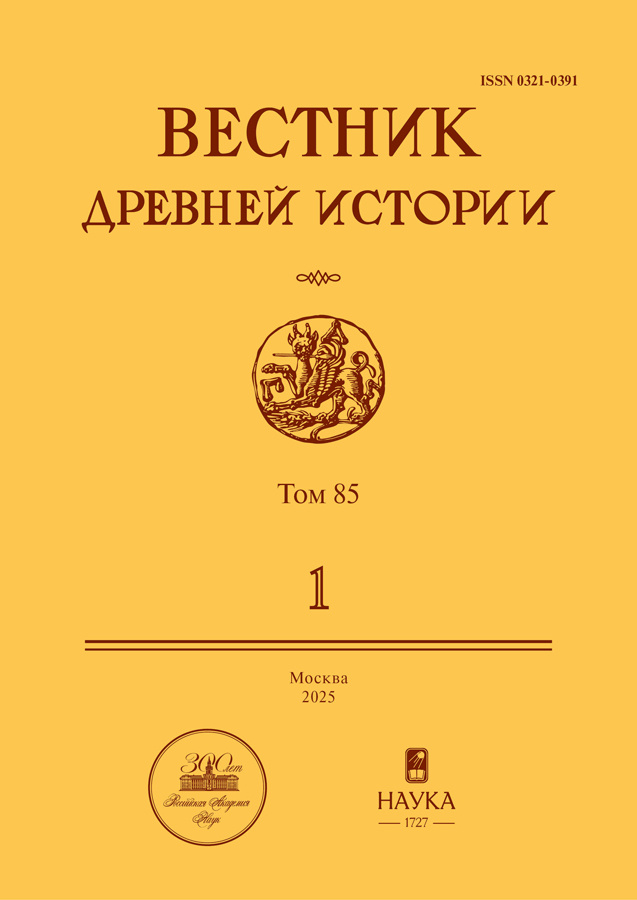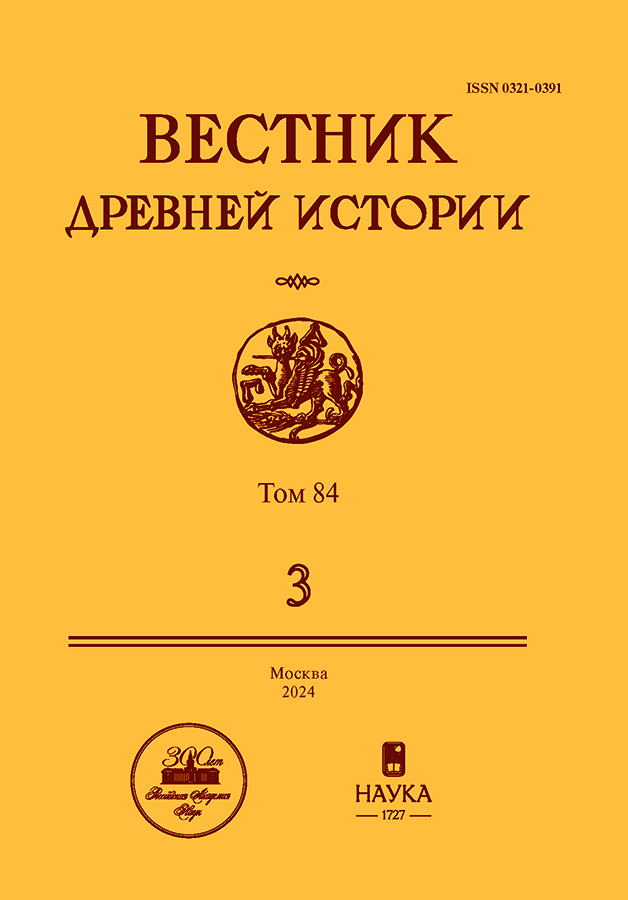Утраченный источник о Персидском походе Юлиана Отступника
- Авторы: Ведешкин М.А.1,2
-
Учреждения:
- Институт всеобщей истории Российской академии наук
- Институт общественных наук РАНХиГС
- Выпуск: Том 84, № 3 (2024)
- Страницы: 708-720
- Раздел: Статьи
- URL: https://rjraap.com/0321-0391/article/view/682341
- DOI: https://doi.org/10.31857/S0321039124030073
- ID: 682341
Цитировать
Полный текст
Аннотация
Статья посвящена проблеме источников так называемого «Сирийского Романа о Юлиане». В ней рассматривается ряд ранее не замеченных сообщений, которые свидетельствуют о том, что по крайней мере часть представленной в «Романе» информации взята из некоего неизвестного сочинения, написанного хорошо осведомленным автором IV в., вероятно являвшимся современником и очевидцем правления Юлиана и ветераном Персидского похода 363 г.
Полный текст
Об авторах
Михаил Александрович Ведешкин
Институт всеобщей истории Российской академии наук; Институт общественных наук РАНХиГС
Автор, ответственный за переписку.
Email: balatar@mail.ru
ORCID iD: 0000-0002-7844-5742
кандидат исторических наук, старший научный сотрудник Центра интеллектуальной истории, доцент кафедры международной политики и зарубежного регионоведения
Россия, Москва; МоскваСписок литературы
- Alföldi, A. 1948: The Conversion of Constantine and Pagan Rome. Transl. by H. Mattingly. Oxford.
- Avi-Yonah, M. 1984: The Jews under Roman and Byzantine Rule: A Political History of Palestine from the Bar Kokhba War to the Arab Conquest. New York.
- Baldwin, B. 1975: The Career of Oribasius. Acta Classica 18, 85–97.
- Barnes, T.D. 1995: Statistics and the Conversion of the Roman Aristocracy. Journal of Roman Studies 85, 135–147.
- Bidez, J. (ed.) 1913: Philostorgius. Kirchengeschichte, mit dem Leben des Lucian von Antiochien und den Fragmenten eines Arianischen Historiographen. Leipzig.
- Bidez, J., Cumont, F. (eds.) 1922: Imp. Caesaris Flavii Claudii Iuliani epistulae, leges, poematia, fragmenta varia. Paris–London.
- Bleckmann, B., Stein, M. 2015: Philostorgios Kirchengeschichte. Bd. 1. Einleitung, Text, Übersetzung. Bd. 2. Kommentar. (Kleine und fragmentarische Historiker der Spätantike, E7). Paderborn.
- Blockley, R.C. 1981: The Fragmentary Classicising Historians of the Later Roman Empire: Eunapius, Olympiodorus, Priscus and Malchus. Liverpool.
- Blömer, M. 2023: Sîn City: Notes on the Moon God of arrān/Carrhae in the Partho-Roman Period. Electrum 30, 307–338.
- Boeft, J. den, Drijvers, J.W., Hengst, D. den, Teitler, H.C. 1995: Philological and Historical Commentary on Ammianus Marcellinus XXII. Groningen.
- Boeft, J. den, Drijvers, J.W., Hengst, D. den, Teitler, H. 2005: Philological and Historical Commentary on Ammianus Marcellinus XXV. Leiden–Boston–Köln.
- Bowersock, G. 1978: Julian the Apostate. Cambridge (MA).
- Brown, P.R.L. 1961: Aspects of the Christianization of the Roman Aristocracy. Journal of Roman Studies 51/1–2, 1–11.
- Cameron, A. 2011: The Last Pagans of Rome. Oxford–New York.
- Chalmers, W.R. 1960: Eunapius, Ammianus Marcellinus, and Zosimus on Julian’s Persian Expedition. Classical Quarterly 10/2, 152–160.
- Curran, J.R. 2000: Pagan City and Christian Capital: Rome in the Fourth Century. Oxford–New York.
- DiMaio, M. 1980: The Antiochene Connection: Zonaras, Ammianus Marcellinus, and John of Antioch on the Reigns of the Emperors Constantius II and Julian. Byzantion 50/1, 158–185.
- DiMaio, M. 1981: “Infaustis Ductoribus Praeviis”: Antiochene Connection, Part II. Byzantion 51/2, 502–510.
- DiMaio, M. 1988: Smoke in the Wind: Zonaras’ Use of Philostorgius, Zosimus, John of Antioch, and John of Rhodes in his Narrative on the Neo-Flavian Emperors. Byzantion 58/1, 230–255.
- Downey, G. 1961: A History of Antioch in Syria: From Seleucus to the Arab Conquest. Princeton (NJ).
- Drijvers, H.J.W. 1994: The Syriac Romance of Julian. Its Function, Place of Origin and Original Language. In: R. Lavenant (ed.), VI Symposium Syriacum 1992. (Orientalia Christiana Analecta, 247). Rome, 201–214.
- Drijvers, J.W. 1999: The Syriac Julian Romance: Aspects of the Jewish–Christian Controversy in Late Antiquity. In: H.L.J. Vanstiphout, W.J. van Bekkum, G.J.H. van Gelder, G.J. Reinink (eds.), All Those Nations: Cultural Encounters within and with the Near East. Groningen, 31–42.
- Drijvers, J.W. 2011: Ammianus, Jovian, and the Syriac ‘Julian Romance’. Journal of Late Antiquity 4/2, 280–297.
- Drijvers, J.W. 2022: The Forgotten Reign of the Emperor Jovian (363–364): History and Fiction. New York.
- Fornara, Ch.W. 1991: Julian’s Persian Expedition in Ammianus and Zosimus. Journal of Hellenic Studies 111, 1–15.
- Frakes, R.M. 1997: Ammianus Marcellinus and Zonaras on a Late Roman Assassination Plot. Historia: Zeitschrift für Alte Geschichte 46/1, 121–128.
- Gassman, M.P. 2020: Worshippers of the Gods: Debating Paganism in the Fourth-Century Roman West. Oxford–New York.
- Greatrex, G., Watt, J.W. 1999: One, Two or Three Feasts? The Brytae, the Maiuma and the May Festival at Edessa. Oriens Christianus 83, 1–21.
- Haehling, R. von 1978: Die Religionszugehörigkeit der hohen Amtsträger des Römischen Reiches seit Constantins I. Alleinherrschaft bis zum Ende der Theodosianischen Dynastie (324–450 BZW. 455 N. CHR.). Bonn.
- Heather, P.J. 1999: Ammianus on Jovian: History and Literature. In: J.W. Drijvers, D. Hunt (eds.), The Late Roman World and Its Historian. Interpreting Ammianus Marcellinus. London–New York, 105–116.
- Hunt, D. 2008: Julian. In: Av. Cameron, P. Garnsey (eds.), Cambridge Ancient History. Vol. XIII. The Late Empire, AD 337–425. Cambridge, 44–77.
- Janiszewski, P. 2006: The Missing Link: Greek Pagan Historiography in the Second Half of the Third Century and in the Fourth Century AD. Warsaw.
- Jeep, L. 1884: Quellenuntersuchungen zu den griechischen Kirchenhistorikern. Leipzig.
- Kelly, G. 2008: Ammianus Marcellinus: The Allusive Historian. Cambridge–New York.
- Kraeling, C.H. 1932: The Jewish Community at Antioch. Journal of Biblical Literature 51, 130–160.
- Kryukova, A.N., Korolev, A.A., Muraviev, A.V., Moiseeva, S.A., Turilov, A.A. 2014: [Cyriacus, St. Mrt.]. In: Pravoslavnaya Entsiklopediya [ Orthodox Encyclopedia ]. Vol. XXXIV. М oscow, 140–145.
- Крюкова, А. Н., Королев, А. А., Муравьев, А. В., Моисеева, С.А., Турилов, А. А. Кириак, c щмч. В кн.: Православная энциклопедия. Т. 34. М., 140–145.
- Lenski, N. 2000: The Election of Jovian and the Role of the Late Imperial Guards. Klio 82 /2, 492–515.
- Levenson, D.B. 2004: The Ancient and Medieval Sources for the Emperor Julian’s Attempt to Rebuild the Jerusalem Temple. Journal for the Study of Judaism in the Persian, Hellenistic, and Roman Period 35 /4, 409–460.
- Lizzi Testa, R. 2022: Christian Emperors and Roman Elites in Late Antiquity. London.
- Machado, C. 2011: Roman Aristocrats and the Christianization of Rome. In: P. Brown, R. Lizzi Testa (eds.), Pagans and Christians in the Roman Empire: The Breaking of a Dialogue (IV th –VI th Century A.D.). Proceedings of the International Conference at the Monastery of Bose (October 2008). Berlin, 493–516.
- Matthews, J. 1989: Roman Empire of Ammianus. London.
- Mazzola, M., van Nuffelen, P. 2023: The Julian Romance: A Full Text and a New Date. Journal of Late Antiquity 16/2, 324–377.
- Moosa, M. (ed.) 2014: The Syriac Chronicle of Michael Rabo (The Great): A Universal History from the Creation. Teaneck (NJ).
- Muraviev, A.V. 1999: The Syriac Julian Romance and Its Place in the Literary History. Khristianskiy Vostok [ Christian Orient ] 1 (7), 194–206.
- Muraviev, A.V. 2004: [Flavius Cl. Iulianus in Antioch before the Persian Campaign Year 363]. Vestnik drevney istorii [ Journal of Ancient History ] 4, 179–190.
- Муравьев, А.В. Флавий Клавдий Юлиан в Антиохии в преддверии Персидской кампании 363 г. ВДИ 4, 179–190.
- Muraviev, A.V. 2020: [The Julian Romance]. In: Pravoslavnaya Entsiklopediya [ Orthodox Encyclopedia ]. Vol. LIX. Moscow, 138–139.
- Муравьев, А.В. «Роман о Юлиане». В кн.: Православная Энциклопедия. Т. 59. М., 138–139.
- Muraviev, A.V. 2021: In Search of the Lost Memoirs of the Persian Mobed Converted to Christianity in the 4 th Century. In: C. Barbati, V. Berti (eds.), Iranianate and Syriac Christianity in Late Antiquity and Early Islamic Period. Wien, 105–122.
- Muraviev, A.V., Vedeshkin, M.A. 2024: Eusebius Pope of Rome, a Legendary Figure of the Hagiographical Tradition. Greek, Roman, and Byzantine Studies 64, 634–653.
- Nöldeke, Th. 1874: Über den syrischen Roman von Kaiser Julian. Zeitschrift der Deutschen Morgenländischen Gesellschaf t 28, 263–292.
- Norman, A.F. (ed.) 1969: Libanius. Selected Orations. Vol. I. Julianic Orations. (Loeb Classical Library, 451). Cambridge (MA)–London.
- Pack, E. 1986: Städte und Steuern in der Politik Julians: Untersuchungen zu den Quellen eines Kaiserbildes. (Collection Latomus, 194). Brussels.
- Patzig, E. 1897: Über Einige Quellen des Zonaras. Byzantinische Zeitschrift 6 /2, 322–356.
- Patzig, E. 1904: Die römischen Quellen des salmasischen Johannes Antiochenus. Byzantinische Zeitschrift 13/1, 13–50.
- Petit, P. 1955: Libanius et la vie municipale à Antioche au IV e siècle après J.-C. Paris.
- Petit, P. 1994: Les fonctionnaires dans l’œuvre de Libanius. Analyse prosopographique. Paris.
- Salzman, M.R. 199 0 : On Roman Time: The Codex-Calendar of 354 and the Rhythms of Urban Life in Late Antiquity. Berkeley–Los Angeles–Oxford.
- Salzman, M.R. 2004: The Making of a Christian Aristocracy: Social and Religious Change in the Western Roman Empire. Cambridge–London.
- Teitler, H.C. 2017: The Last Pagan Emperor: Julian the Apostate and the War against Christianity. New York.
- Treadgold, W. 2007: The Byzantine World Histories of John Malalas and Eustathius of Epiphania. International History Review 29/4, 709–745.
- Treadgold, W. 2019: Byzantine Historiography and the Supposedly Lost Books of Ammianus Marcellinus. In: B. Outtier, C.B. Horn, B. Lourié, A. Ostrovsky (eds.), Armenia between Byzantium and the Orient. Celebrating the Memory of Karen Yuzbashyan (1927–2009). Leiden–Boston, 530–579.
- Van Esbroeck, M. 1987: Le soi-disant roman de Julien l’Apostat. In: H.J.W. Drijvers, R. Lavenant, C. Molenberg, G.J. Reinink (eds.), Symposium Syriacum 1984, Literary Genres in Syriac Litterature (Groningen-Oosterhesselen, 10–12 September). Rome, 191–202.
- Vedeshkin, M.A. 2018: Yazycheskaya oppozitsiya khristianizatsii Rimskoy imperii IV–VI vv. [ Pagan Opposition to Christianization of the Roman Empire in the Fourth–Sixth Centuries ]. Saint Petersburg.
- Ведешкин, М. A. Языческая оппозиция христианизации Римской империи IV – VI вв. СПб.
- Vedeshkin, M.A. 2022: The Pagan Father for Olympias the Deaconess. Scrinium: Journal of Patrology and Critical Hagiography 18/1, 407–419.
- Wood, Ph. 2010: ‘ We Have No King but Christ’: Christian Political Thought in Greater Syria on the Eve of the Arab Conquest (c. 400–585). Oxford–New York.
- Wood, Ph. 2018: Historiography in the Syriac-Speaking World, 300–1000. In: D. King (ed.), The Syriac World. London–New York, 405–421.
- Woods, D. 2000: Ammianus Marcellinus and the ‘Rex Alamannorum’ Vadomarius. Mnemosyne 53, 690–710.
- Zaytsev, D.V. 2008: [Eusebius]. In: Pravoslavnaya Entsiklopediya [ Orthodox Encyclopedia ]. Vol. XVII. Moscow, 237–238.
- Зайцев, Д.В. Евсевий. В кн.: Православная Энциклопедия. Т. 17. М., 237–238.
Дополнительные файлы











